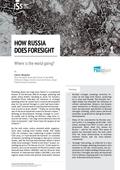You are here

Strategic foresight in China
Introduction
Over the last few decades, analysis of international relations and strategic issues has developed rapidly in China, both within the Chinese Communist Party– state apparatus and in think tanks and universities. However, the richness of this field of study is in stark contrast to the absence of any real open reflection on the question of foresight. If, like other nations, China is committed to understanding the world in which it is evolving and to identifying possible changes, the function of foresight has not been conceptualised or institutionalised to the same degree as in the West. Foresight analysis in China is marked by several salient features: firstly, it remains almost non-existent in Chinese institutional frameworks dedicated to the analysis of international relations; secondly, the concepts of the ‘black swan’ and the ‘grey rhino’ have made a significant breakthrough, particularly in economics, before being cannibalised and politicised by the Party; and thirdly, the reading of the horizon remains essentially informed by the Party’s vision, fears and obsessions.
Foresight in the Chinese system: conspicuous by its absence?
It must be stated at the outset that foresight appears to be almost totally absent from China’s institutional arrangements. Except in the fields of the ‘hard’ sciences and particularly in medicine or seismology, in which China has undertaken to develop its anticipatory capacities, there is, to our knowledge, no public organisation dedicated exclusively to preparing for strategic surprises or anticipating unexpected events in international relations. Nor are there any flagship publications such as those of the National Intelligence Council in the United States that would shine a light on the characteristics of foresight thinking in China. Foresight seems thus conceived as a marginal and secondary function of the analysis of international relations.
None of the main Chinese think tanks1 and research centres operating in the field of international relations really deal with foresight. The China Institutes of Contemporary International Relations,2 the China Institute of International Studies3 and the Shanghai Institutes for International Studies, which are among the most influential Chinese think tanks, do not have a department or even a team dedicated to foresight analysis, and few of their articles take this dimension into account. The same can be said of the Institute of International and Strategic Studies at Peking University. The only major institution that deals with foresight issues seems to be the Development Research Centre of the State Council, but through the sole prism of technological innovation.
While the issue of foresight is little addressed by academia, it is even more difficult to assess its status within more official organisations. Some bodies would have a legitimate mandate to carry out such work, such as the Ministry of Foreign Affairs (MOFA) or the intelligence services (the Ministry of State Security and the Joint Staff Department of the People’s Liberation Army in particular), whose missions would justify the production of frequent work on anticipating future developments. Yet the MOFA does not seem to have a permanent body for this purpose. As for the Ministry of State Security, even if anticipating developments, especially acts of contestation, is one of its duties,4 the level of secrecy allows for only vague conjectures as to the methods and concepts implemented by Chinese intelligence officers, and no organisation dedicated to foresight has ever been identified. The same is true of the military services.
Foresight seems thus conceived as a marginal and secondary function of the analysis
of international relations.
The reasons for the absence of real work on foresight are multiple and difficult to pinpoint: Western work on the subject is insufficiently well-known, there is a strong degree of bureaucratic rigidity and the return on investment for those who do the job is too low, but the pre-eminent factor remains the weight of the ideology of the Party. Indeed, analysts have completely internalised the Party’s expectations and vision of history; they have developed a specific habitus – in the French sociologist Pierre Bourdieu’s sense of the word for speaking that renders any work of imaginative analysis completely illusory. To avoid the bureaucratic risks inherent in the work of foresight – a misreading of the world’s evolution (from an ideological point of view) can slow down or even abort a career – intelligence services have developed the habit of relying on foreign published works that they seize and disseminate as they stand.
One dimension of foresight analysis, however, has been undergoing rapid development in recent years. Some Chinese companies have built up a service portfolio for corporate and public-sector clients that exploits the potential of big data. This is notably the case of Global Tone Communication Technology,5 a major player in this field in China, which advises its customers on risk warning, public-opinion risk assessment (social media intelligence) and special-event tracking. However, the details of the methods applied and the role played by these analyses within the Party state apparatus remain poorly understood and would require further work.
The emergence of the concepts of the 'black swan' and the 'grey rhino'
While the Chinese regime is disinclined to carry out anticipatory work, the concepts of ‘black swan’ and ‘grey rhino’ have emerged in Chinese discourse in recent years. In the mid-2010s, economists began to use these concepts to draw attention to certain risks ignored by the government, notably that of public debt. In 2017, the governor of the People’s Bank of China, Zhou Xiaochuan, published an article highlighting the need to strengthen the prevention of ‘black swans’ (黑天鹅) and ‘grey rhinos’ (灰犀牛).6 But before the scientific community had grasped these concepts clearly enough to give them a rigorous definition, the Party fossilised them, thereby hindering any possibility of serious analytical work. From 21 to 24 January 2019, the Party held a seminar on risk and stability at the Central Party School. In his opening speech on 21 January, Xi Jinping stressed two essential objectives: the prevention of major risks and the safeguarding of economic and social stability. The Party leader thus urged cadres to be on their guard against potential black swans and to watch out for grey rhinos to ensure the regime’s political security.7 But this should not be taken as evidence that the authorities are willing to stimulate the implementation of a future-oriented vision.
The organisation of this seminar was probably motivated by the unrest in Venezuela following the rise of Juan Guaidó to head of the National Assembly at the beginning of January and his campaign to challenge President Maduro’s power. These events have clearly revived the Party’s fears of a colour revolution in China prompted by Washington. Although Xi Jinping alluded to other kinds of black swans, linked to technology or finance, for instance, it is the risk of a colour revolution that haunts the regime. The Party regularly accuses the United States of fostering democratic revolutions in the world and of nourishing such ambitions in China. For instance, in 2016 it made one such accusation through a rap group linked to the Communist Youth League, CD Rev (天府事变), which published a song online entitled ‘Beware of Colour Revolutions’ (‘警惕颜色革命’). The Party undoubtedly deemed that the notion of black swans offered an effective means of reminding Party cadres about the need to combat this insidious threat to the monopoly of its power. On the other hand, in doing so the Party deprived itself of a notion that could have helped it to revitalise its entire approach to strategic surprises.
Although Xi Jinping alluded to other kinds of black swans, linked to technology or finance, for instance, it is the risk of a colour revolution that haunts the regime.
What visions are there of potential futures?
The existing literature seldom discusses disruptive scenarios; potential black swans and grey rhinos are more likely to be threats that have been well identified. Moreover, while many analyses continue to mention the period of strategic opportunity which would allow China to consolidate its power while avoiding the risk of conflict, the discourse is evolving, giving more consideration to the likelihood of the risk of conflict, particularly with the United States. The global environment is thus perceived as less and less favourable: rising protectionism, declining globalisation, expanding populism in Europe and North America and the emergence of unpredictable strongmen likely to create strategic surprises. On the economic front, the dangers are mounting with the inexorable rise in debt and the spectre of youth unemployment. Below are a few examples of issues illustrating this world view.
The Chinese diaspora
Because its people are well-versed in the cultural codes that allow them to easily disseminate the Western values to which they have been exposed, the Chinese diaspora constitutes a major threat to the Party’s monopoly of power in China. It is therefore within the diaspora that the ideological battle and the information warfare must be first waged to impose a narrative that strengthens the Party’s legitimacy.
China's rivalry with the United States
Apart from the preservation of the regime, China’s relationship with the United States is undoubtedly one of the most compelling obsessions and concerns of the Chinese leadership and academia. Most academic analyses admit that the United States has experienced a relative decline, but the country will remain the world’s leading power. It will no longer be able to dominate the international system and will have to join together with other major powers. The world will be multipolar with an uneven distribution of power. The most widespread vision, however, is not that of a zero-sum game that could lead to increased friction between Beijing and Washington. Moreover, Chinese experts seem less inclined than Americans (who are more likely to adhere to the theory of Thucydides’ trap) to think that a war is inevitable. That being said, Trump’s presidency is perceived to have been an accelerator of American decay and a risk factor, of which the trade war was a worrying illustration. The Party leaders, for their part, see the rivalry with the United States primarily on an ideological level. The competition with Washington is therefore not only about material dominance but also about imposing values, norms and institutions on the adversary. This is where the struggle between Beijing and Washington differs from the Cold War: the United States and China share the same world, which each believes must be shaped according to its own aspirations.8 The Party’s ambition is therefore to enforce globalisation under the umbrella of Chinese standards. This is precisely the essence of the Party’s motto, ‘a community of common destiny for mankind’, put forward by Xi Jinping.
A power vacuum
According to some Chinese analysts, the general situation in China is far from being more favourable than before the emergence of Covid-19. The epidemic has revealed that China faces almost unprecedented challenges. Besides, China’s ability to fill the vacuum left by the Trump administration’s abandonment of global leadership is weaker than many had predicted. China’s soft power, resources and experience are limited, while the internal and external obstacles China will face will be immense. These analysts therefore fear China’s potential weakness, which would leave the world without a leader.9
The role of artificial intelligence (AI)
Chinese analysts believe that AI will be crucial in international country rankings, and that AI will be a key technology from which a whole wave of innovations will arise. To dominate the AI sector is to become the leading industrial power of the future.
To dominate the AI sector is to become the leading industrial power of the future.
The gigantic investments made by China to become the world leader in AI will enable Beijing to overtake the United States in the industry. But the race for AI is not only a practical challenge, as these new technologies will have implications in an almost infinite number of fields (e.g. medicine, finance, transport and education, not to mention defence): it also has a symbolic dimension, as if China asserts its supremacy in this domain it may have an international impact even greater than the Soviet launch of Sputnik in 1957.
Looking ahead
Demonetised by the Party and ignored by most researchers and think-tankers, foresight analysis in China is struggling to develop into a repertoire of heuristic tools and a way of understanding the world. But intellectual innovation could come from science-fiction literature, which is undergoing a revival in China and offers exciting new prospects for unveiling the future.
References
1. Think tanks, in the North American sense of the term, do not really exist in China insofar as all the organisations referred to here are affiliated with a state ministry or agency and are therefore not truly independent.
2. The China Institutes of Contemporary International Relations is part of the Ministry of State Security, of which it is reportedly the eighth office.
3. The China Institute of International Studies reports to the MOFA.
4. Weng Yanqing (翁衍慶), 中共情報組織與間諜活動 (“The organisation of intelligence services and espionage activities of the Communist Party of China”), 新銳文創, 2018.
5. Samantha Hoffman, Engineering Global Consent – The Chinese Communist Party’s data-driven power expansion, Australian Strategic Policy Institute, 2019.
6. Luo Xiaoqiang (骆晓强), Liang Quanqi (梁权琦) and Yang Xiaoguang (杨晓光), ‘当前中国经济的 “灰犀牛”和“黑天鹅”’, (‘“Grey rhino” and “black swan” for current China’s economy’), Bulletin of Chinese Academy of Sciences, 2017, vol. 32, no. 12, pp. 1356–1370, http://www.bulletin.cas.cn/publish_article/2017/12/20171210.htm.
7. “习近平:警惕 ‘黑天鹅’ 防范 ‘灰犀牛’” (“Xi Jinping: Beware of ‘black swans’ and protect yourself from ‘grey rhinos’”), Renmin ribao, January 22, 2019, http://paper.people.com.cn/rmrbhwb/html/2019-01/22/content_1905265.htm.
8. Daniel Tobin, “How Xi Jinping’s ‘New Era’ Should Have Ended U.S. Debate on Beijing’s Ambitions”, report adapted from testimony submitted to the US– China Economic and Security Review Commission’s hearing on “A ‘China Model?’ Beijing’s promotion of alternative global norms and standards”, Center for Strategic and International Studies, 2020, https://www.uscc.gov/sites/default/files/testimonies/SFR%20for%20USCC%20TobinD%2020200313.pdf.
9. ‘时殷弘:准确认知疫情给中国带来的困难形势,及时调整对外战略和策略_外交_钝 角网’ (“Shi Yinhong: Acknowledging the difficult conditions caused by the outbreak in China and adjusting foreign strategy and tactics in time”), 钝角网, May 11, 2020, http://www.dunjiaodu.com/waijiao/5939.html.


